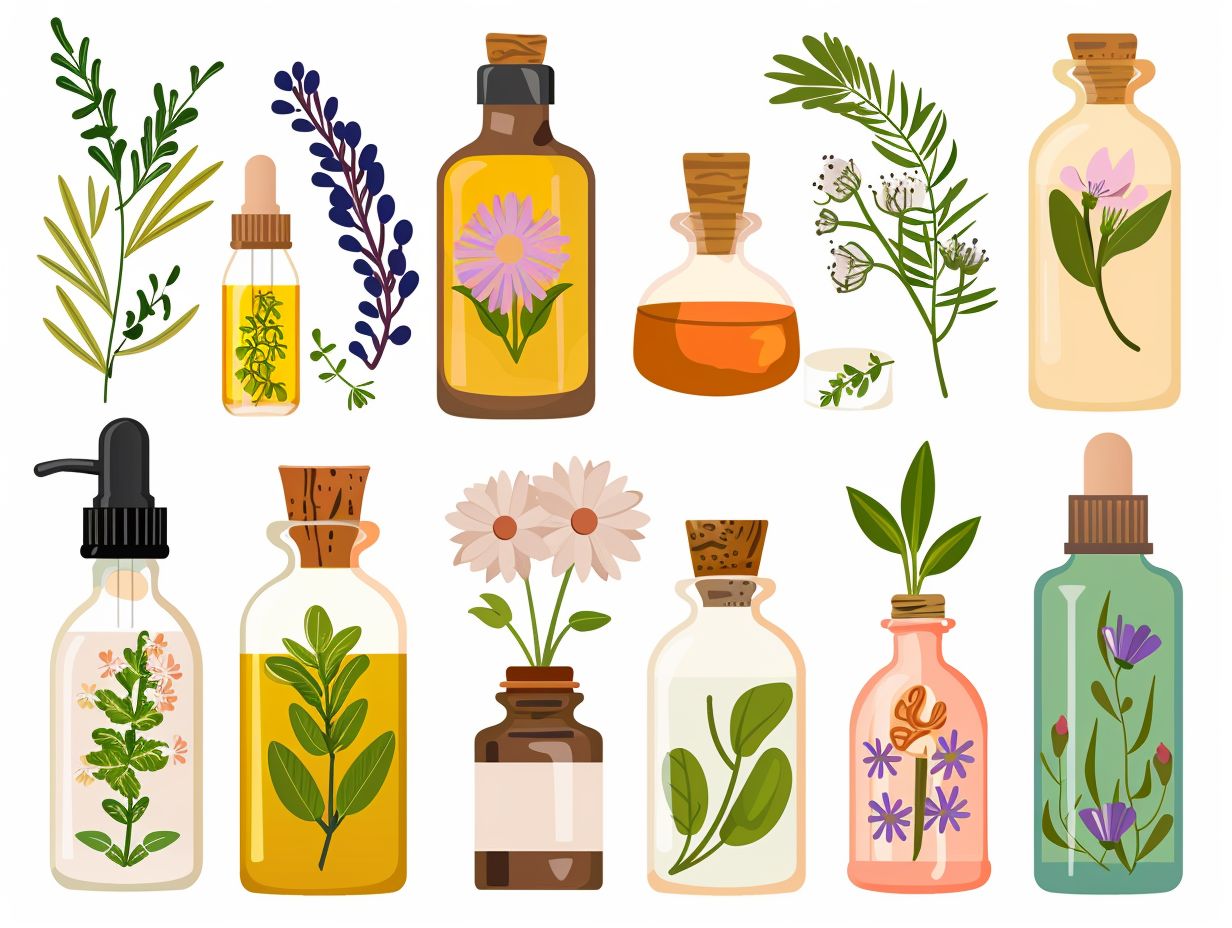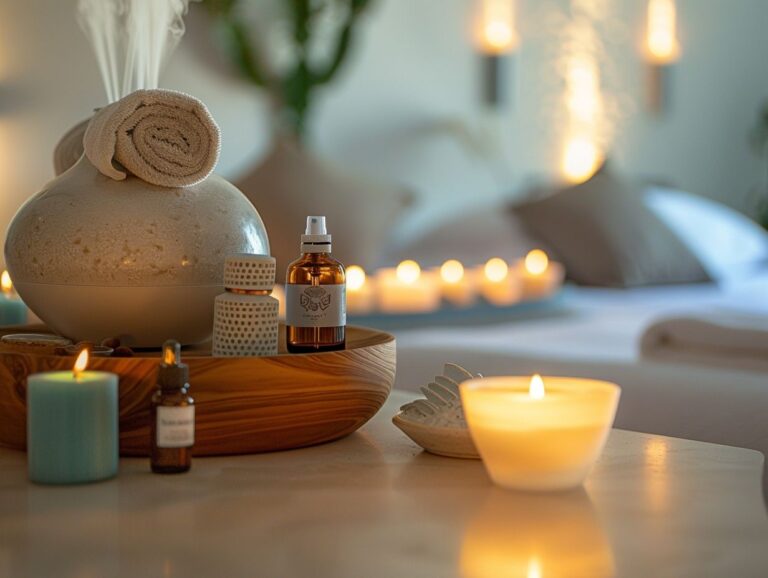How Many Aromatherapy Oils Are There
Aromatherapy is a holistic healing practice that utilizes the power of essential oils to promote physical and emotional well-being.
With a wide variety of aromatherapy oils available, it can be overwhelming to know where to start.
Discover the different types of aromatherapy oils, including floral, citrus, herbal, spicy, woody, earthy, medicinal, resinous, exotic, and blended oils.
We will also discuss the benefits of aromatherapy, how to choose the right oil, potential risks and side effects, and precautions to take when using these powerful oils.
If you’re curious about the world of aromatherapy, keep reading to learn more!
Key Takeaways:
What is Aromatherapy?
Aromatherapy is the practice of using essential oils extracted from natural sources like plants and fruits to enhance psychological and physical well-being. These essential oils contain aromatic compounds that are obtained through methods such as cold pressing or solvent extraction.
Fragrance extraction in aromatherapy involves various techniques, including steam distillation, expression, and enfleurage, to capture the essence of plants. The aromatic compounds found in essential oils, such as terpenes, esters, and phenols, interact with the body through inhalation or skin absorption, affecting mood and health. Terpenes, for example, are known for their calming effects, while esters can have a soothing influence.
- Aromatherapy is believed to offer a range of benefits for mental and physical well-being, including stress relief, improved sleep, boosted immunity, and enhanced relaxation. Different essential oils, like lavender for relaxation or peppermint for focus, can be utilized based on their unique properties.
- The inhalation of essential oil vapors can trigger responses in the brain that stimulate emotions and memories, promoting feelings of calmness or energy. The topical application of diluted essential oils can aid in skincare, pain relief, and muscle relaxation due to their therapeutic properties.
How Many Aromatherapy Oils Are There?
There is a vast array of aromatherapy oils available, each containing unique individual aroma compounds sourced from various natural sources like plants and trees. These oils are extracted using methods such as cold pressing or solvent extraction.
One of the most popular and versatile aromatherapy oils is lavender oil, known for its calming properties. Originating from the lavender plant, this oil is extracted through steam distillation, preserving its soothing floral scent.
In contrast, citrus oils like lemon and orange are cold-pressed from the fruit peel, giving them their refreshing and uplifting aromas.
On the other hand, spicy oils such as ginger oil or clove oil are derived from the roots or buds of plants, offering warming and invigorating scents.
What Are Essential Oils?
Essential oils are concentrated liquids containing aroma compounds derived from natural sources like plants, fruits, and seeds. These oils capture the essence of the plant and are typically extracted through methods such as cold pressing or solvent extraction.
These aromatic oils are highly concentrated, with each drop containing a plethora of natural compounds that contribute to their distinct fragrance and potential benefits. The quality of essential oils is determined by various factors, including the plant species, cultivation methods, and extraction processes involved.
Cold pressing, one of the common extraction techniques, involves applying pressure to plant material to obtain the essential oil without exposing it to heat, thus preserving its delicate constituents. This gentle method is preferred for obtaining oils from citrus fruits like oranges and lemons, ensuring that the true essence of the fruit is captured in the final product.
What Are Carrier Oils?
Carrier oils are neutral, stable oils used to dilute essential oils for safe application on the skin or in aromatherapy. These oils act as a base, carrying the volatile liquid aroma compounds of essential oils for effective and safe use.
Along with their dilution function, carrier oils have their own therapeutic properties that can enhance the benefits of essential oils. Popular carrier oils include jojoba, coconut, almond, and grapeseed oil, each offering unique skin-nourishing qualities. The molecular structure of carrier oils helps slow down the evaporation rate of essential oils, ensuring a longer-lasting fragrance on the skin.
How Are Aromatherapy Oils Used?
Aromatherapy oils are utilized in various applications, including aromatherapy for therapeutic benefits, food flavoring for enhancing taste, and perfumery for creating captivating scents. These oils are obtained through methods like cold pressing or solvent extraction.
Aromatherapy oils have gained popularity in holistic healing practices due to their calming and stress-relieving properties. In culinary arts, these oils can elevate dishes with their unique flavors and aromas, adding depth to the overall sensory experience. The perfumery industry relies on these oils to craft distinct and enchanting fragrances that leave a lasting impression. The meticulous extraction process ensures the purity and quality of the oils, preserving their therapeutic and aromatic essences.
What Are the Different Methods of Aromatherapy?
Aromatherapy employs various methods to harness the benefits of essential oils, including diffusion, topical application, inhalation, and baths. These oils are extracted using techniques like cold pressing or solvent extraction.
Diffusion is one of the most common ways to enjoy the aromatic benefits of essential oils. This method involves dispersing the oils into the air using devices like diffusers, allowing you to inhale the therapeutic scents.
On the other hand, topical application involves applying diluted essential oils directly to the skin for absorption.
In terms of inhalation, steam inhalation or adding oils to hot water releases the aroma for you to breathe in.
What Are the Benefits of Aromatherapy?

Essential oils are extracted from various plants, flowers, herbs, and fruits, each containing unique properties that interact with the body and mind in distinct ways.
Lavender oil, for example, is renowned for its calming effects, perfect for unwinding after a long day. On the other hand, citrus oils like lemon and orange can uplift and invigorate the senses, ideal for boosting mood and energy levels. The therapeutic benefits of these essential oils go beyond mere fragrance; they work synergistically to promote overall well-being and harmony within the body.
What Are the Different Types of Aromatherapy Oils?
Aromatherapy oils can be categorized into various types based on their scent profiles and therapeutic properties. These categories include floral oils, citrus oils, herbal oils, spicy oils, woody oils, earthy oils, medicinal oils, resinous oils, exotic oils, and blended oils.
Floral oils, such as lavender and rose, are renowned for their calming and relaxing properties, making them ideal for stress relief and sleep enhancement. Citrus oils like lemon and orange are invigorating and uplifting, perfect for boosting mood and energy levels. Herbal oils like peppermint and eucalyptus are commonly used for promoting focus and clearing congestion. Spicy oils such as ginger and cinnamon offer warming and stimulating effects, great for circulation and digestion.
Floral Oils
Floral oils are derived from flowers and are known for their sweet, floral scents that evoke feelings of serenity and relaxation. Some popular floral oils include jasmine oil, rose oil, and lavender oil.
Each of these floral oils holds unique properties that make them stand out in the world of aromatherapy.
Jasmine oil is renowned for its rich, exotic aroma and is often used to uplift the mood and reduce anxiety. On the other hand, rose oil is cherished for its romantic scent and is beloved for its skin-nourishing benefits. Lavender oil is a versatile favorite, known for its calming effects and its ability to promote relaxation and improve sleep quality.
Citrus Oils
Citrus oils are extracted from citrus fruits and are known for their invigorating and refreshing scents. Some well-known citrus oils include bergamot oil, lemon oil, and orange oil.
These citrus oils are not only popular for their enchanting fragrances but also for their revitalizing properties. Bergamot oil, derived from the rind of the bergamot orange, is often used in aromatherapy for its calming effects. Lemon oil, with its zesty scent, is prized for its ability to uplift the mood and promote mental clarity. On the other hand, orange oil is cherished for its energizing aroma, which can help combat feelings of fatigue and promote a sense of vitality.
Herbal Oils
Herbal oils are extracted from various herbs and plants, offering a range of therapeutic benefits and aromatic profiles. Examples of herbal oils include basil oil, peppermint oil, and chamomile oil.
These distinct herbal oils have been traditionally used for their healing properties, such as relieving stress, promoting relaxation, and uplifting mood.
- Basil oil is renowned for its analgesic and antibacterial qualities.
- Peppermint oil is often favored for its cooling sensation and digestive aid benefits.
- Chamomile oil is prized for its soothing and anti-inflammatory effects, making it a popular choice for skin care and aromatherapy.
Spicy Oils
Spicy oils offer warm and aromatic scents that evoke feelings of comfort and coziness. Common spicy oils include cinnamon oil, clove oil, and nutmeg oil.
Each of these spicy oils carries a unique profile that contributes to their soothing properties. For instance, cinnamon oil is renowned for its sweet and spicy scent, often associated with holiday cheer and relaxation. The warm and earthy aroma of clove oil can create a sense of grounding and tranquility, making it a popular choice for enhancing feelings of security and warmth. On the other hand, nutmeg oil exudes a rich and slightly spicy fragrance that is both comforting and invigorating, perfect for promoting a cozy ambiance during colder seasons.
Woody Oils
Woody oils emanate earthy and grounding scents that promote a sense of stability and connection to nature. Noteworthy woody oils include sandalwood oil, cedarwood oil, and pine oil.
These essential oils are cherished for their calming properties and ability to ground the mind and spirit.
Sandalwood oil, known for its luxurious aroma, is often used in meditation practices to enhance focus and relaxation.
Similarly, cedarwood oil boasts a woody fragrance that brings a feeling of warmth and stability to any space.
Pine oil, with its fresh and invigorating scent, is a popular choice for promoting clarity of thought and revitalizing the senses.
Earthy Oils

These oils are highly valued not only for their fragrant properties but also for their therapeutic benefits in aromatherapy. Aromatherapy champions these earthy oils for their ability to connect individuals back to nature and provide a sense of relaxation and tranquility.
-
Patchouli oil, derived from the Pogostemon cablin plant, is known for its musky, sweet, and earthy aroma that promotes mental clarity and uplifts the spirits.
-
Vetiver oil, extracted from the roots of the Vetiveria zizanioides grass, offers a deep, woody scent that aids in grounding scattered energies and fostering a sense of stability.
-
Oakmoss oil, obtained from the lichen Evernia prunastri, has a rich, earthy fragrance that encourages introspection and inner strength.
Medicinal Oils
Medicinal oils possess therapeutic properties that promote health and well-being. Well-known medicinal oils include tea tree oil, eucalyptus oil, and peppermint oil.
Aromatherapy, a practice dating back centuries, harnesses the power of these oils to improve physical and mental health. The antibacterial and antifungal properties of tea tree oil make it a popular choice for skin conditions like acne. Eucalyptus oil is renowned for its ability to clear sinuses and alleviate respiratory issues, while peppermint oil is often used for its cooling and invigorating effects. These oils are commonly used in massages, diffusers, and even homemade skincare products, offering a natural and holistic approach to enhancing well-being.
Resinous Oils
Resinous oils emit warm and comforting scents reminiscent of tree resins, offering a sense of grounding and tranquility. Notable resinous oils include frankincense oil, myrrh oil, and balsam of Peru.
These oils have been cherished for centuries for their therapeutic properties and are often used in aromatherapy to promote relaxation and mental clarity. When diffused, the earthy and resinous aromas of these oils create a serene atmosphere, ideal for meditation or winding down after a long day.
Frankincense, known for its uplifting qualities, can help alleviate stress and anxiety, while myrrh is often used for its balancing effect on emotions. Balsam of Peru, with its rich and aromatic scent, is valued for its ability to soothe the mind and spirit.
Exotic Oils
Exotic oils offer unique and captivating scents that transport the senses to far-off lands and evoke a sense of adventure. Exotic oils include ylang-ylang oil, patchouli oil, and sandalwood oil.
Ylang-ylang oil, also known as the ‘flower of flowers,’ is derived from the fragrant petals of the ylang-ylang tree, primarily found in Asian regions like the Philippines and Indonesia. Its sweet, floral aroma is revered for its calming properties, making it a popular choice for relaxation and stress relief in aromatherapy.
Similarly, patchouli oil, with its earthy and musky scent, has a rich history in ancient cultures like India and China, where it was prized for its grounding and sensual qualities. It is often used in perfumes and skincare products for its soothing and mood-enhancing effects.
On the other hand, sandalwood oil, obtained from the heartwood of the sandalwood tree, exudes a woody and warm fragrance that is both exotic and comforting. This oil is renowned for its meditative and spiritual significance, promoting mental clarity and relaxation.
Blended Oils
Blended oils combine different essential oils to create harmonious and synergistic aromatic profiles that offer unique therapeutic benefits. Popular blends include lavender chamomile, citrus mint, and woody spice.
Creating these blends requires a deep understanding of each essential oil’s properties, volatility, and therapeutic effects to achieve a balanced final product. A harmonious blend like lavender chamomile soothes the mind and body, perfect for relaxation and promoting sleep.
Citrus mint blends, on the other hand, are invigorating and refreshing, combining the uplifting scents of citrus fruits with the cooling vibes of mint for a revitalizing experience.
Woody spice blends bring warmth and depth, mixing earthy woody notes with spicy accents to create a grounding effect, ideal for moments when you seek balance and inner strength.
How to Choose the Right Aromatherapy Oil?
Selecting the right aromatherapy oil involves considering individual preferences, desired benefits, and intended applications. Understanding the properties and effects of different oils can help in choosing the most suitable one for specific needs.
In terms of personal preferences, it’s essential to consider the scents that resonate with you the most. Some individuals may find citrusy oils invigorating, while others prefer the calming effects of floral scents. For those seeking relaxation, lavender oil is a popular choice due to its soothing properties. On the other hand, if you’re looking to boost energy and focus, oils like peppermint or eucalyptus could be more suitable.
Therapeutic benefits play a crucial role in selecting an aromatherapy oil. For instance, tea tree oil is well-known for its antibacterial and antifungal properties, making it a great option for skincare or treating minor cuts and scrapes. Eucalyptus oil, with its decongestant properties, is often used to alleviate respiratory issues.
Are There Any Risks or Side Effects of Using Aromatherapy Oils?
While aromatherapy oils offer numerous benefits, there are potential risks and side effects to be aware of, such as skin irritation, allergic reactions, and sensitivities. Precautions should be taken to prevent adverse effects when using essential oils.
One of the primary concerns when using essential oils is skin irritation, which can manifest as redness, itching, or burning sensations. Individuals with sensitive skin or conditions like eczema should be particularly cautious. Performing a patch test before widespread application can help identify any adverse reactions. Allergic responses to certain oils can vary widely, ranging from mild itching to severe respiratory distress. It is essential to consult an aromatherapy specialist to ensure the chosen oils are suitable for your individual needs.
What Precautions Should Be Taken When Using Aromatherapy Oils?

Essential oils are potent extracts that can cause skin irritation or allergic reactions if used incorrectly. To dilute essential oils properly, aim for a low concentration of around 1-5% when mixing with carrier oils like jojoba or coconut oil. It is advisable to always perform a patch test by applying a small amount of the diluted oil on the inner forearm and waiting for 24 hours to check for any adverse effects. When using essential oils in diffusers, follow manufacturer guidelines and ensure proper ventilation to prevent respiratory issues. Remember, consulting a qualified aromatherapy practitioner for personalized advice is also recommended when in doubt.
Frequently Asked Questions
How Many Aromatherapy Oils Are There?
There is no exact number, as new essential oils are constantly being discovered and produced. However, it is estimated that there are over 90 commonly used essential oils in aromatherapy.
What are some popular aromatherapy oils?
Some popular aromatherapy oils include lavender, peppermint, eucalyptus, tea tree, and lemon. These oils have a wide range of uses and benefits in aromatherapy.
Are all essential oils suitable for aromatherapy?
No, not all essential oils are suitable for aromatherapy. Some oils are not considered safe for use in aromatherapy due to potential side effects or lack of therapeutic properties. It is important to do your research and consult with a professional before using any essential oils for aromatherapy.
Can I mix different aromatherapy oils together?
Yes, you can mix different aromatherapy oils together to create your own unique blend. However, it is important to research the properties and potential interactions of each oil before creating a blend.
How do I know which aromatherapy oils to use?
The choice of aromatherapy oils will depend on your specific needs and preferences. It is recommended to consult with a qualified aromatherapist to determine which oils would be most beneficial for your individual needs.
Are there any side effects from using aromatherapy oils?
While essential oils are generally safe to use, some people may experience mild side effects such as skin irritation, allergic reactions, or headaches. It is important to use oils in recommended dilutions and to discontinue use if any adverse reactions occur.







One Comment